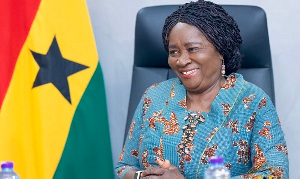Razia Khan, Standard Chartered’s Head of Africa Research and a well-known analyst on African markets has revealed. A new International Monetary Fund (IMF) programme might help credibility, but spending cuts are also needed, she suggested.
In the bank’s latest Africa focus report, the renowned international economist added: “With expenditure on public-sector salaries accounting for more than 70% of revenue in 2014, Ghana has little choice; Public-sector salaries must be made a key target for fiscal reforms”. Madam Khan also disagreed with the Bank of Ghana (BoG) that the new directives introduced within eight weeks to manage foreign exchange transactions within the country are working.
She said: “Measures to deal with foreign exchange market pressure have not worked and have done little to restore confidence in the Ghanaian economy”.
Madam Khan suggested that the “market shortage of foreign market must be eliminated to encourage new investor participation in local markets. The easiest way to do this would be to allow the market to find its own clearing levels”.
Avoiding a debt trap
She noted: “The rapid rise in yields on short-term debt, which now threatens Ghana’s debt sustainability, could be averted. Ghana should allow foreign investors to buy short-dated debt instruments and should not restrict foreign investors to longer-dated maturities”.
Madam Khan and her team of researchers at the Standard Chartered, a parent company of Standard Chartered Bank Ghana, warned that if debt service costs rise faster than nominal gross domestic product (GDP), Ghana could find itself in a debt trap.It should also persist with efforts to lengthen its yield curve, even if this means issuing smaller amounts of longer-dated debt and reopening the same maturities at a later stage.
Over-dependence on very short-term financing was a key contributor to current problems, they noted.
The report emphasized: “With a starting point of little room for manoeuvre, and external conditions tightening Ghana’s policy choices are limited. The medium-term outlook still has significant positives.
Ghana’s share of oil revenue will increase and new oil discoveries should boost output in the coming years. Production from the Tweneboa, Enyenra and Ntomme(TEN) oilfield is due to begin by 2016.
Construction of gas infrastructure is underway, promising eventual cheaper power supply. But navigating the near-term challenges is important to outcome.
Currently, Ghana is experiencing load shedding as a result of power challenges due to problems with some of the machines that were due for repairs, and the erratic and unreliable supply of gas from Nigeria. Growth momentum appears to be slowing, potentially worsening public debt ratios. Real GDP grew just 0.3% year-on-year in third quarter of 2013; the slowdown was blamed on declining gold output and a maintenance shutdown of the Jubilee oilfield.
Momentum in other parts of the economy was insufficient to compensate for this slowdown. The IMF has cut its 2013 real GDP growth estimate to 5.5% and warns that 2014 growth is unlikely to exceed 4.8%.
While the researchers at Standard Chartered are less bearish than the IMF on the near-term outlook, they agree that Ghana faces challenges.
A resumption of power shortages will dampen growth. Room for capital expenditure is likely to squeeze. They are consequently revising down the bank’s GDP forecasts. They still see some recovery in the medium term, reflecting new oil and gas production –but this will be from a weaker base.
Given its worsening debt profile, Ghana’s revenue-generating efforts will receive less investor attention. This is unfortunate, as the rise in Ghana’s revenue-to-GDP ratio since the 2010 GDP rebasing has been impressive.
Revenue collection was an estimated 18% of GDP in 2013, up from only 13% in 2009. But spending increased much faster, clouding the improvement.
Serious Challenges
Ghana faces great challenges in the near term. Symptoms of financial distress are rising. The Ghanaian cedi (GH¢) has depreciated rapidly, touching GH¢2.67 at the end of March, from GH¢ 2.30 at the beginning of 2014.
Despite BoG measures aimed at improving supply of foreign exchange and a clampdown on dollarisation, a large amount of foreign exchange demand remains unmet at current exchange rates.
The market shortage is estimated at USD 1.2bn. Were the foreign exchange market to clear, the GH¢ would likely come under even greater pressure, the report stated.
Yields on Ghana’s local-and foreign -currency debt have spiked. The 5-Year local-currency bond yield reportedly reached 27% in March in the secondary market, prompting the authorities to cancel a planned primary auction.
Even front-end yields have been pressured. In March, the yield on the 91-day T-bill reached 22.2% again (after having fallen on efforts to lengthen the maturity of domestic debt and reduce short-term borrowing).
Business News of Saturday, 5 April 2014
Source: The Chronicle












